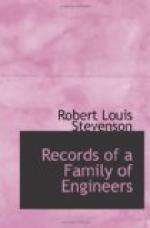paper, which were at last bound up, rudely indexed,
and put by for future reference. Such volumes
as have reached me contain a surprising medley:
the whole details of his employment in the Northern
Lights and his general practice; the whole biography
of an enthusiastic engineer. Much of it is useful
and curious; much merely otiose; and much can only
be described as an attempt to impart that which cannot
be imparted in words. Of such are his repeated
and heroic descriptions of reefs; monuments of misdirected
literary energy, which leave upon the mind of the
reader no effect but that of a multiplicity of words
and the suggested vignette of a lusty old gentleman
scrambling among tangle. It is to be remembered
that he came to engineering while yet it was in the
egg and without a library, and that he saw the bounds
of that profession widen daily. He saw iron ships,
steamers, and the locomotive engine, introduced.
He lived to travel from Glasgow to Edinburgh in the
inside of a forenoon, and to remember that he himself
had ’often been twelve hours upon the journey,
and his grand-father (Lillie) two days’!
The profession was still but in its second generation,
and had already broken down the barriers of time and
space. Who should set a limit to its future
encroachments? And hence, with a kind of sanguine
pedantry, he pursued his design of ‘keeping
up with the day’ and posting himself and his
family on every mortal subject. Of this unpractical
idealism we shall meet with many instances; there was
not a trade, and scarce an accomplishment, but he thought
it should form part of the outfit of an engineer;
and not content with keeping an encyclopaedic diary
himself, he would fain have set all his sons to work
continuing and extending it. They were more
happily inspired. My father’s engineering
pocket-book was not a bulky volume; with its store
of pregnant notes and vital formulas, it served him
through life, and was not yet filled when he came to
die. As for Robert Stevenson and the Travelling
Diary, I should be ungrateful to complain, for it
has supplied me with many lively traits for this and
subsequent chapters; but I must still remember much
of the period of my study there as a sojourn in the
Valley of the Shadow.
The duty of the engineer is twofold—to
design the work, and to see the work done. We
have seen already something of the vociferous thoroughness
of the man, upon the cleaning of lamps and the polishing
of reflectors. In building, in road-making, in
the construction of bridges, in every detail and byway
of his employments, he pursued the same ideal.
Perfection (with a capital P and violently under-scored)
was his design. A crack for a penknife, the
waste of ‘six-and-thirty shillings,’ ’the
loss of a day or a tide,’ in each of these he
saw and was revolted by the finger of the sloven;
and to spirits intense as his, and immersed in vital
undertakings, the slovenly is the dishonest, and wasted
time is instantly translated into lives endangered.




